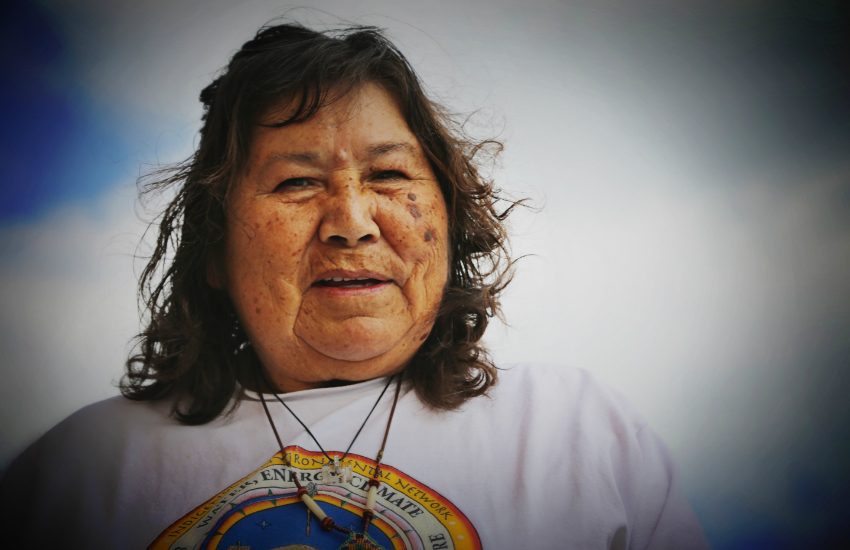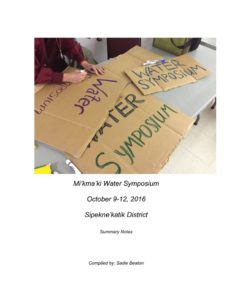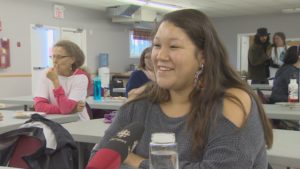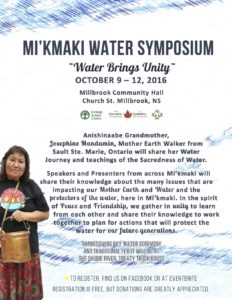
31 Oct “Water Brings Unity” – Mi’kma’ki Water Symposium
The Mi’kma’ki Water Symposium, which took place in the Millbrook Mi’kmaq First Nation community, was a four day event (October 9-12th) organized by Grassroots Mi’kmaq Grandmother Dorene Bernard with support from CCRN’s Sadie Beaton. The purpose of the Symposium was to explore and share Mi’kmaq and settler knowledge about issues affecting water across Mi’kma’ki (Atlantic Canada). The theme of the Symposium was “Water Brings Unity” and the arc of the agenda led participants towards a place of togetherness from which we could begin working towards actions we can all take to protect water for our future generations.

Download pdf report: Mi’kma’ki Water Symposium – October 9-12, 2016 – Sipekne’katik District – Summary Notes Compiled by Sadie Beaton.
Elder Anishinaabe Grandmother Josephine Mandamin was the honoured guest at the Symposium. She is a Mother Earth Walker from Sault Ste. Marie, Ontario and came to share her Water Journey, along with teachings about the sacredness of water, and women’s role in protecting it. Other speakers and presenters from across Mi’kma’ki shared their knowledge and stories about the many issues impacting our water, including an exploration by CCRN’s Sadie Beaton on potential roles for allies interested in ensuring that their efforts to support water protection work also contributes to decolonization. The event also featured a unique indigenous-hosted Thanksgiving feast and a water ceremony to root our learnings and actions in sacredness.
Dorene Bernard says the hope is Indigenous and non-Indigenous people will share knowledge about protecting the land and water and return to their communities with strategies for how to continue that work: “A lot of people in Nova Scotia don’t know about the struggles that people are having in our own province about the damage to the water and how it’s impacting people… We need to connect with the water in ways that you probably don’t really understand unless you are without your water, like we were for months, just a couple of years ago, in Indian Brook. Or like the people of Potlotek right now, for that matter. You take for granted that there will always be clean tap water.”

Participant of the symposium from Eel River Bar First Nation, N.B
Image Credit: CBC News
The event, Bernard suggests, is also about building relationships: “Part of my reconciliation as a survivor of the Shubenacadie Residential School is to build relationships, with everybody really, and show people who we are, and change and decolonize their minds about what they were taught about our history. We make a lot of friendships through this process, and educate people about our shared history and about consultation and treaty rights, and water seems to be the common denominator.” Finally, the symposium is also about allowing Mi’kmaq women to resume the positions they have traditionally held, says Bernard: “In our cultural and spiritual roles we bear responsibility as women, this is what we must do. Through history women have been minimized, more so for native women. As we gain those things back, healing from residential schools and colonialism, we are teaching our children to love our water and Mother Earth.”
Bernard hopes this won’t be the first and only water symposium and that it will send a message to government and corporations that the Mi’kmaq won’t stand by if the land is abused. “We’re at a crisis where these things are being ignored. Climate change is being ignored,” she said, “The water has been crying out for help. Mother Earth has been crying out and nobody has been listening.”

Symposium poster
The agenda for the symposium was jam-packed and featured various activities promoting the “Water Brings Unity” theme. The first day, centered around the presence of Josephine Mandamin, focused on teachings about the sacredness of water. October 10th featured a Thanksgiving Day feast at the Shubenacadie River Treaty Truck House, where Alton Gas intends to release brine in the ecologically sensitive river. Josephine Mandamin and Sipekne’katik elder Isabelle Knockwood conducted a Sacred Water ceremony. “That day is to give thanks for all that Mother Earth provides for us, and to remind us how we are responsible to take care of her for each generation,” Bernard says. October 11 and 12th shifted to knowledge sharing about the issues affecting water, and what people have been doing to protect it. Topics of discussion included: Alton Gas; the risks posed by turbines in the Bay of Fundy; the water crisis in Potlotek First Nation; and Ingrid Waldron on environmental racism. Bernard says that “people will go home with some concrete ideas about what we can do, as Nova Scotians and as Mi’kmaq.”
Featured image: Anishinaabe Grandmother Josephine Mandamin, Mother Earth Water Walker. Credit: IndigenousRising.org
The information contained in this post is partially adapted from http://www.cbc.ca/beta/news/canada/nova-scotia/mikmaki-water-symposium-indigenous-day-of-action-1.3799333 and https://nsadvocate.org/2016/10/06/mikmaki-water-symposium-is-all-about-giving-thanks-and-sharing-knowledge/ and CCRN researcher Sadie Beaton


